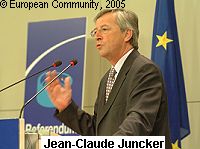Juncker rubbishes Blair's analysis of EU budget imbalance
Presenting his analysis of the previous week's controversial Council meeting to MEPs in the European Parliament on 22 June, Luxembourg's outgoing Council President Jean-Claude Juncker rejected criticisms of the EU's spending priorities made by UK Prime Minister Tony Blair, who takes over the EU reins on 1 July. In the aftermath of the 18 June European Council meeting, Mr Blair pointed to the fact that the EU spends a far higher proportion of its budget on agricultural subsidies than on research and innovation, and questioned whether this is a sensible prioritisation for the 21st century. In response, Mr Juncker told MEPs: 'People talk all sorts of rubbish. You have to compare like with like.' He argued that since research is primarily funded on a national basis while agriculture is wholly financed from the EU budget, a more accurate comparison would be between the 524 billion euro that will be spent on research at national and EU level between 2007 and 2013 at current rates, and the 305 billion euro investment in agriculture at EU level for the same period. Assessing the achievements of his country's six-month leadership of the EU, Mr Juncker highlighted the new impetus given to the Lisbon strategy under the Luxembourg Presidency, with the Council agreeing a new body of guidelines that will form the basis of national reform plans. 'Those who call for modernisation of the EU while giving the impression that others are blind to the challenges ahead should read their own decisions and apply them, rather than constantly calling for new ones,' he added pointedly. On the specific question of the Financial Perspective, Mr Juncker quoted his own words to the European Parliament, made in a speech back in January: ''We will do all in our power to reach an agreement, but we have no illusions. Member States have taken entrenched positions from which it will be hard to break out.' I was right!' Finally, he revealed his belief that any future compromise on the EU budget would change only marginally from the size of budget proposed in the final Luxembourg Presidency compromise. In his own address to the European Parliament on 23 June, the incoming Council President Tony Blair maintained his belief that the EU requires a new policy agenda, but rejected accusations that he is seeking to promote a purely economic model. '[S]ome have suggested I want to abandon Europe's social model. But tell me: what type of social model is it that has 20 million unemployed in Europe, productivity rates falling behind those of the USA; that is allowing more science graduates to be produced by India than by Europe; and that, on any relative index of a modern economy - skills, R&D, patents, IT - is going down not up?' He continued: 'The purpose of our social model should be to enhance our ability to compete, to help our people cope with globalisation, to let them embrace its opportunities and avoid its dangers. Of course we need a social Europe. But it must be a social Europe that works.' The way to achieve this vision is already clear, said Mr Blair: '[I]mplementing the Lisbon agenda. On jobs, labour market participation, school leavers, lifelong learning, we are making progress that nowhere near matches the precise targets we set out at Lisbon. That agenda told us what to do. Let us do it.' He concluded: 'Investment in knowledge, in skills, in active labour market policies, in science parks and innovation, in higher education, in urban regeneration, in help for small businesses. This is modern social policy, not regulation and job protection that may save some jobs for a time at the expense of many jobs in the future.' For his part, Commission President José Manuel Barroso praised the major achievements of the Luxembourg Presidency, in particular the renewal of the Lisbon Strategy, and said that he looked forward to the UK taking things forward. However, he finished by warning against any downgrading of the Parliament and Commission proposals on the Financial Perspective, warning that growth, jobs, competitiveness, education, innovation and research would all suffer.
Countries
Luxembourg, United Kingdom



